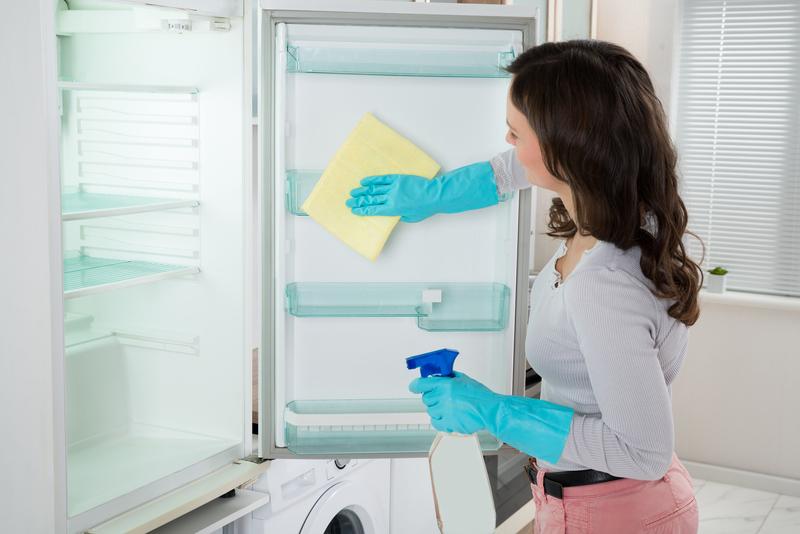Master the Art of Removing Pet Odors
Posted on 17/06/2025
Master the Art of Removing Pet Odors: Your Ultimate Guide
Are you struggling to eliminate unpleasant scents from your furry friends? Learning to master the art of removing pet odors is an essential skill for every pet parent. Whether it's dog smells lingering on your couch, or cat urine accidents on your carpets, being proactive and equipped with the right knowledge makes all the difference. This comprehensive guide will help you banish pet odors from your home, making it fresher and healthier for everyone.

Why Is Removing Pet Odors Important?
Pet odors are more than just an inconvenience. Persistent animal smells can indicate deeper hygiene or health issues, deter guests, and affect your living environment. Here are a few reasons why you need to address pet smells promptly:
- Maintains home hygiene: Odors can harbor bacteria, allergens, and germs.
- Promotes health: Eliminating smells reduces the risk of respiratory problems and allergies.
- Protects surfaces: Quick action prevents permanent staining and damage to furniture and flooring.
- Enhances comfort: A fresh-smelling home is more enjoyable and welcoming for family and friends.
Understanding the Sources of Pet Odors
Effective pet odor removal starts by understanding the different sources of animal smells in your home. Knowing the cause helps you tailor your cleaning strategy for maximum results. Common sources include:
- Pet urine and feces accidents on carpets and floors
- Hair, dander, and natural oils from fur
- Saliva on pet beds, toys, and furniture
- Wet dog smell after outdoor adventures or baths
- Litter boxes, cages, and aquariums
How Do Pet Odors Linger?
Many pet odors are caused by bacteria breaking down organic matter, which creates foul-smelling compounds. Urine, for instance, contains proteins and ammonia that soak into porous surfaces, making them difficult to remove with ordinary cleaning. These invisible remnants keep odors coming back if not properly treated.
Top Techniques to Remove Pet Odors from Your Home
Ready to reclaim your home? Here's how you can remove dog smells, cat odors, and other pet scents from every corner of your living space.
1. Attack Pet Urine and Feces Accidents Immediately
Urine and feces are primary sources of strong pet odors. The quicker you act, the better your chances of eliminating lingering smells.
- Blot--Don't Rub: Use paper towels or a clean cloth to blot up as much liquid as possible. Rubbing can push the stain deeper into the material.
- Apply an enzymatic cleaner: These specialty cleaners use natural enzymes to break down odor-causing proteins at the molecular level. Always follow the product instructions for maximum effectiveness.
- Rinse and clean: Rinse the area with cold water and blot dry again. Repeat if necessary.
- Let it dry completely: Open windows or use fans to speed up drying and prevent mildew.
2. Deodorize Carpets and Rugs
Carpets trap hair, dander, and smells deep in their fibers. Here's a step-by-step guide to freshen carpets and rugs:
- Vacuum thoroughly to remove loose debris and pet hair.
- Sprinkle baking soda liberally across the carpet, letting it sit for at least 30 minutes to absorb odors. For stubborn smells, leave it overnight.
- Vacuum again to pull up the baking soda and the odors with it.
- Use carpet shampoo or a steam cleaner with an enzymatic solution for deep cleaning. This will help reach embedded odors and stains.
Tip: Use a HEPA-filter vacuum to capture allergens and finer particles for a truly fresh finish.
3. Wash Pet Bedding and Soft Furnishings
Pet beds, blankets, and cushions quickly accumulate odors. To master the art of removing pet odors from fabrics:
- Launder with hot water and a mild detergent.
- Add 1 cup of white vinegar during the rinse cycle for extra deodorizing power.
- Dry outdoors in sunlight when possible; UV rays help kill bacteria and neutralize remaining smells.
- Wash regularly--ideally once a week--to stay ahead of pet smells.
4. Remove Odors from Hard Floors
Tile, laminate, and hardwood floors resist stains better than carpet, but can still harbor pet odors in cracks and grout lines.
- Sweep or vacuum regularly to prevent hair and dander build-up.
- Mop with a pet-safe cleaning solution (such as a mix of water and white vinegar) to neutralize odors.
- Dry thoroughly to prevent warping or mold growth--especially on hardwood.
5. Deep Clean Upholstery and Furniture
Couches, chairs, and other soft furniture can absorb pet scents. Fight pet odors on upholstery with these steps:
- Vacuum with upholstery attachments to lift away hair and crumbs.
- Spot clean stains with an enzymatic or vinegar-based cleaner; test in an inconspicuous area first.
- Use fabric-safe sprays or baking soda for additional deodorizing between washes.
*When possible, use furniture covers that can be easily washed. This acts as a first line of defense against pet smells.
Pet Odor Removal from Air and Ventilation
Don't let pet odors linger in the air you breathe! Mastering air quality improves your whole home's freshness.
Tips for Airborne Pet Odor Control
- Open windows daily for natural ventilation.
- Change HVAC filters regularly to capture dander and allergens.
- Use air purifiers with activated carbon filters, specifically designed for pet owners.
- Burn candles or use essential oil diffusers for a pleasant scent boost, but always choose pet-safe options.
Litter Boxes, Crates, and Cages
Special areas like litter boxes and cages are hotspots for persistent pet odors. Here's how you can keep them odor-free:
- Scoop litter daily and change it frequently. Consider odor-absorbing and clumping litters for the best performance.
- Wash litter boxes and cages weekly with mild soap and hot water; avoid harsh chemicals that may harm your pet.
- Add a thin layer of baking soda beneath litter for added odor control.
- Use washable liners or pads for easy cleaning in cages and crates.
Natural and DIY Pet Odor Eliminators
DIY solutions are both effective and affordable. Here are some natural methods to remove pet odors:
- Baking soda: An all-purpose odor absorber for carpets, bedding, and shoes.
- White vinegar: Mixed with water, this neutralizes urine smells and deodorizes surfaces.
- Lemon juice: Freshens hard surfaces and leaves a pleasant scent (test on surfaces first).
- Activated charcoal: Place charcoal sachets in rooms or near litter boxes to trap odors.
- Homemade spray: Combine 1 part water, 1 part vinegar, and a few drops of pet-safe essential oil for a quick deodorizer.
*Before using any DIY remedy, always check if the ingredients are safe for your specific pet species.
Prevent Future Pet Odors
The best way to keep your home smelling fresh is by preventing pet odors before they start. Here's how to master pet odor prevention:
- Groom pets regularly: Bathe and brush your pets to control shedding, dander, and oil build-up.
- Maintain dental hygiene: Oral bacteria can lead to bad breath and transfer onto household items.
- House-train pets: Teach dogs and cats appropriate bathroom habits to avoid indoor accidents.
- Feed high-quality food: Healthier diets mean less waste and milder natural odors.
- Schedule regular vet check-ups: Some persistent smells could indicate medical issues that need attention.
Design Your Home with Pets in Mind
- Use washable rugs and slipcovers: Easy to clean and replace as needed.
- Choose stain-resistant furniture: Modern fabrics can resist soaking up pet accidents and odors.
- Designate pet-friendly areas: Limit your pet's access to sensitive spots like bedrooms or dens.
Common Mistakes to Avoid
In your quest to remove stubborn pet odors, avoid these common pitfalls:
- Using ammonia-based cleaners: Ammonia mimics the smell of urine and may attract pets to re-soil the area.
- Masking instead of removing: Air fresheners only cover odors--proper cleaning and treatment are essential.
- Skipping deep cleaning: Superficial cleaning doesn't reach embedded smells. Regular deep cleaning is key.
- Neglecting routine maintenance: Pet odor management is an ongoing process, not a one-time fix.
When to Call a Professional
If stubborn pet odors persist after diligent cleaning, you may need to call in the experts. Professional pet odor removal services use industrial-strength enzymes, specialized equipment, and deep cleaning methods to restore your home's freshness. This option is especially helpful for:
- Old or set-in urine stains on carpets or furniture
- Mold or mildew smells
- Rental properties or homes on the market
- Severe pet accidents in large or hard-to-clean areas
Summary: Freshen Your Home and Life
You can master the art of pet odor removal by understanding the sources of smells, acting quickly on accidents, using the right cleaning techniques, and incorporating preventive habits. A fresh, odor-free home isn't just good for your pets--it's a win for your family, your guests, and your sense of well-being.
With these proven strategies, you're now equipped to say goodbye to embarrassing pet odors forever. So go on--enjoy the unconditional love of your pets, and the comfort of a home that always smells clean.

Frequently Asked Questions: Pet Odor Removal
How can I get the smell of pet urine out of my carpet?
Use an enzymatic carpet cleaner as soon as possible. Blot up excess urine, apply the cleaner directly, let it sit per instructions, then rinse and blot dry. Repeat as needed for stubborn odors.
What if I can't find the source of a bad smell?
Use a black light to detect pet urine stains on carpets and furniture. Sniff around baseboards or under furniture for hidden accidents, and check in corners or behind objects your pet may access.
Are homemade pet odor removers safe?
Most are safe when using simple ingredients like baking soda or vinegar. Always double-check that your cleaning solution is non-toxic for pets and test on inconspicuous surfaces first.
Why does my home still smell even after cleaning?
Odors may be trapped in unseen or hard-to-reach areas (like under carpets or in HVAC systems), or cleaning may not have neutralized the bacteria. Use a combination of deep cleaning, air purifiers, and professional help for persistent odors.
Key Takeaways on Mastering Pet Odor Removal
- Act quickly on accidents for best results.
- Deep clean all pet areas, from carpets to beds, on a regular basis.
- Utilize natural deodorizers like baking soda, vinegar, and activated charcoal.
- Prevention is just as important as cleaning--groom, sanitize, and train pets regularly.
- Call in professionals if all else fails, for a truly fresh start.
With these tips, you'll become an expert in the removal of pet odors and enjoy a home that's clean, inviting, and perfectly suited for life with your beloved furry companions.




